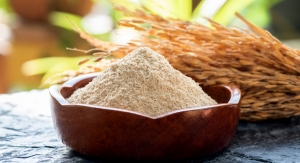“Rice bran is rich in lipids and fatty acids that are beneficial to health but it’s typically polished off and discarded because it goes rancid,” explained Elizabeth Ryan, PhD, lead researcher and assistant professor in the College of Veterinary Medicine and Biomedical Sciences. “I wondered why we couldn’t overcome this. There’s plenty available; technologically we just need to figure out what to do with it.”
To that end, Dr. Ryan is currently pursuing a global health research project, titled “Studying How Rice Bran Augments Mucosal Immunity,” that will explore rice bran’s ability to fight off multiple gut pathogens (e.g., Salmonella and Rotovirus) that contribute to the morbidity and mortality of children around the world.
“The number of kids who are dying of diarrhea around the world every day deserves rigorous research attention with practical, wide-reaching solutions—there are so many pathogens, and over time it wears on your gut, immunity and ability to grow,” Dr. Ryan said. “It’s very hard to vaccinate against all these bugs at the exposure levels that exist.”
Despite its discarded byproduct status, Dr. Ryan said rice bran has been associated with a variety of health benefits, including cardiovascular benefits, and published animal studies detailing its colon and intestinal cancer fighting properties. The lingering caveat is that its mechanisms of action and beneficial dosage details are as yet unknown. “We have a trial going on now to find this out,” she said, “but it’s not just about finding out about one or two compounds, it’s about keeping it whole.”
The project is funded by a Phase II $1 million Grand Challenges Explorations (GCE) grant from the Bill and Melinda Gates Foundation. In 2010, Dr. Ryan was awarded a Phase I grant for her program. GCE Phase I grants recognize individuals worldwide who are taking innovative approaches to some of the world’s toughest and persistent global health and development challenges. Phase II recognizes ideas that have made significant progress toward implementation.
There are numerous cultivars of brown rice and Dr. Ryan said the health benefits might be just as distinct as the agronomic varietals. “We don’t know how subtle or drastic cultivar differences are and that’s what we’re doing with our Gates Foundation money,” she said, and noted that she and her team are currently in the early phases of screening cell cultures to begin the process of identifying and testing bran from rice varieties around the globe. Her co-principal investigators are Professor Steve Dow, a leader in mucosal immunology, and University Distinguished Professor Jan Leach in the College of Agricultural Sciences.
In the meantime, Dr. Ryan is excited about the prospect of studying food as a form of medicine. “There’s a lot of opportunity for using food as complementary medicine, particularly in the gut,” she said. “We know that there is an immune system in the gut that responds not just to bacteria, viruses and microbial communities, but also to plant compounds and foods. The combination of the metabolism of the microbes of our foods that also can stimulate our immunities in the gut is an area that has had very little investigation.”
Though pre- and probiotics and probiotic-containing foods are most commonly associated with gut health, Dr. Ryan pointed to a study to which she contributed last year that showed whole rice bran supplementation reduced the susceptibility to a specific strain of Salmonella in mice, and outlined how rice bran helped promote the growth of native lactobacillus in mice.
She explained there’s a big difference between taking a probiotic to colonize bacteria in the gut in comparison to eating foods that nurture the bacteria already native to one’s GI tract. “It’s more of a long-term solution to GI health and improved gut immunity,” she said. “A lot of the microbiome research that’s emerging is talking about the bacteria that’s coming from birth in our gut, it’s not like we can change that drastically but we can modify that by what we eat.
“We know that microbial communities differ in populations around the world,” she continued. “The role of diet is an area that’s been under-investigated, particularly as it relates to the bulk of our staple foods, not just fruits and vegetables. That’s what we consider exciting about rice—it feeds half of humanity and it feeds our microbes. Rice bran has chemical and pre-biotic properties that could have tremendous global health impact by basically preventing and reducing the severity of diarrheal infections.”
Dr. Ryan refrained from discussing what she believed might be an optimal “dose” of rice bran. “I hesitate to use the word dose with food,” she said. “We know very little about moderating dose with food—we always think about limiting our food intake—but if there’s some healthful benefits to our foods we need to think about increasing our intakes."


















